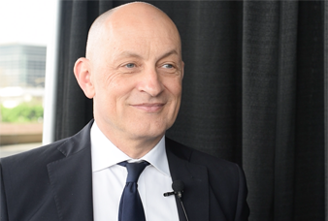VIDEO
Daratumumab Significantly Decreased Progression, Death for Relapsed Myeloma
A three-drug regimen that includes daratumumab, bortezomib, and dexamethasone may be the new standard of care for patients with relapsed or refractory multiple myeloma.
Dr. Palumbo discusses results of the CASTOR trial
CHICAGO-A three-drug regimen that includes the anti-CD38 monoclonal antibody daratumumab, bortezomib, and dexamethasone may be the new standard of care for patients with relapsed or refractory multiple myeloma, according to Antonio Palumbo, MD, chief of the myeloma unit at University of Torino in Italy, who presented interim analysis results of the CASTOR trial (abstract LBA4) during a press conference at the 2016 American Society of Clinical Oncology (ASCO) Annual Meeting, held June 3–7 in Chicago.
Patients in the study who were treated with daratumumab had a reduction in the risk for progression or death of 61% (hazard ratio [HR], 0.39 [95% CI, 0.28–0.53]) and double the rate of complete response and very good partial response compared with patients treated with bortezomib and dexamethasone (Vd) alone.
“Daratumumab-Vd should be considered a new standard of care for relapsed and refractory multiple myeloma,” Palumbo said.
Early-phase studies of daratumumab in combination with bortezomib showed deep and durable responses, with the drug combination being well-tolerated. This phase III trial included 498 patients with multiple myeloma who had one or more prior lines of treatment. Patients were randomly assigned to 8 cycles of bortezomib plus dexamethasone with or without 16-mg/kg daratumumab. The primary endpoint was progression-free survival.
At a median follow-up of 7.4 months, daratumumab reduced the risk for progression by 61% and reduced the time to tumor progression by 70% (HR, 0.30 [95% CI, 0.21–0.43]; P < .0001) compared with bortezomib/dexamethasone alone. Palumbo said that these results are “unprecedented” in randomized studies that compare novel treatments in relapsed or refractory myeloma.
The median progression-free survival was not yet reached for the daratumumab arm of the trial compared with 7.16 months for the bortezomib/dexamethasone alone arm. Additionally, the median time to tumor progression was not yet reached in patients assigned daratumumab compared with 7.29 months for bortezomib/dexamethasone alone.
The overall response rate was 83% for the daratumumab arm compared with 63% for the control arm (P < .0001). The number of patients achieving a complete response (19% vs 9%; P = .0012) and a very good partial response or better (59% vs 29%; P < .0001) with daratumumab was significantly improved compared with bortezomib/dexamethasone alone.
According to Palumbo, the addition of daratumumab did not significantly increase any toxicity that was already present in the combination bortezomib and dexamethasone arm. Patients in the daratumumab group experienced slightly higher rates of thrombocytopenia and peripheral neuropathy, but according to Palumbo this was mainly due to the fact that the experimental arm was exposed to bortezomib longer in comparison to the control arm that had a higher proportion of early progressions.
Navigating AE Management for Cellular Therapy Across Hematologic Cancers
A panel of clinical pharmacists discussed strategies for mitigating toxicities across different multiple myeloma, lymphoma, and leukemia populations.
